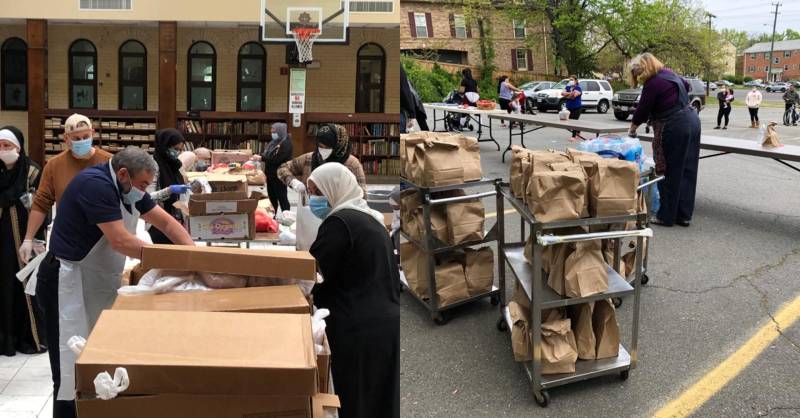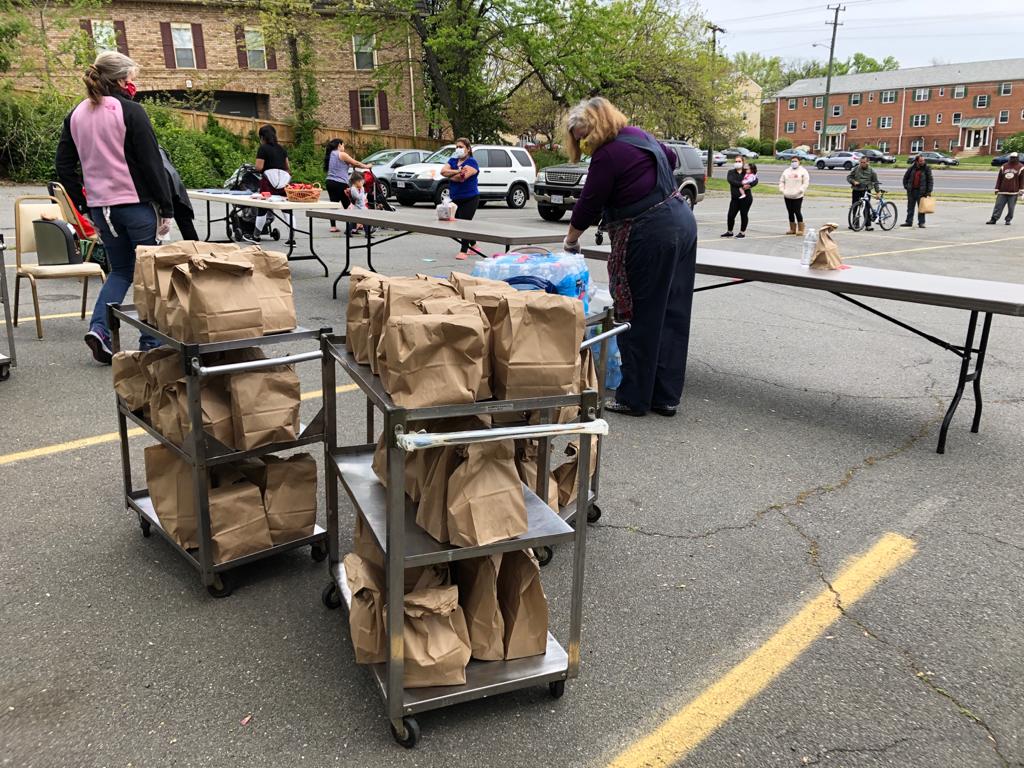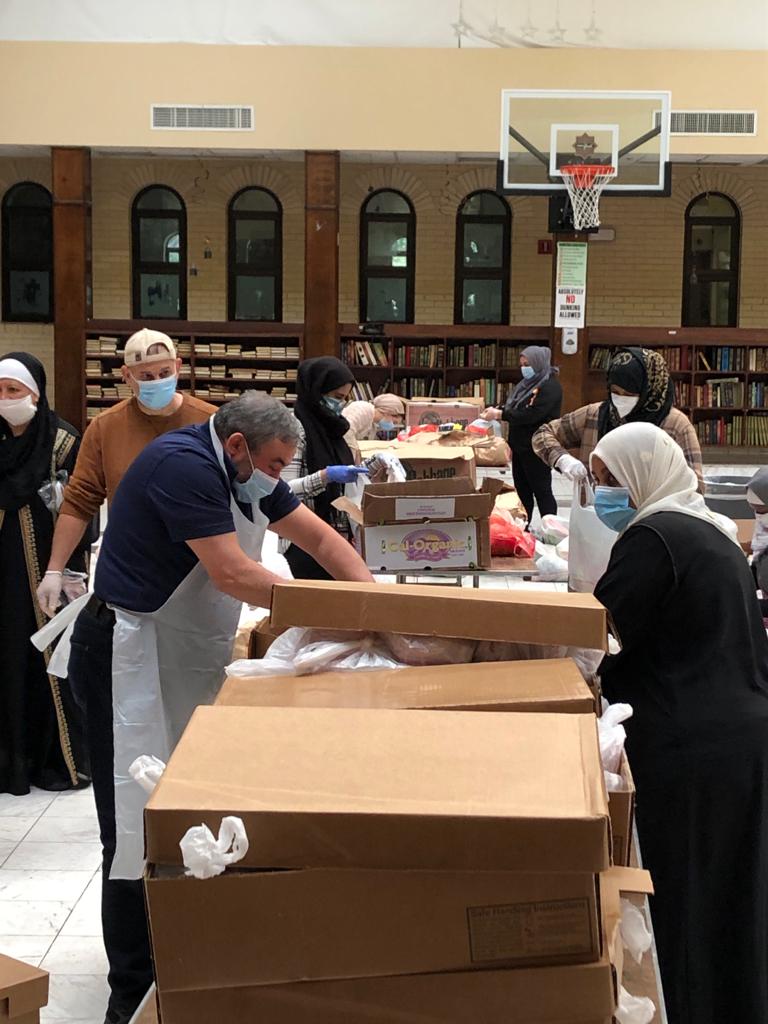
A Muslim-led charity, Islamic Relief United States of America (IRUSA) got spotlighted by the Department of Homeland Security Centre for a Faith and Opportunity Initiatives team, as one of the partners whose “initiatives” usually go unnoticed. It has stepped up even further to facilitate Church emergency services that are overstretched during the coronavirus crisis.
Since its inception, 27-years ago, IRUSA, a non government organisation located in Alexandria, United States, has provided food and humanitarian assistance around the globe to people in need, regardless of their faith, gender, race or ethnicity.
IRUSA responded to the pandemic by raising its emergency fund from $1.9million to $5 million, disseminating it as grants across the States, to essential social services programs run by local mosques and social service organisations to help meet public needs of the growing emergency crisis.
The emergency grants mobilized a network of community partners to provide social services, hygiene kits items to the homeless and financial assistance to those affected during the crisis.
As places of worship were ordered to shut down during the pandemic, the majority of mosques and churches, dependent on weekly congregational donations struggled to preserve their social services program.
“One of the most difficult decisions was stopping Friday prayers.” said Saif Rahman, the director of public and government affairs at Dar Ul-Hijrah, Islamic centre. Rahman has worked with the Islamic centre since 1989 and never experienced a situation where the mosque was forced to close – not even after 9/11— when many Muslims saw a spike in hate crimes and received death threats.

Shutting the mosque to prevent risk of contagion to 3000-4000 weekly attendees also meant that they had to cancel their annual fundraising banquet, which usually covered 10-12% of their annual fundraising budget.
A huge worry for all charities in the faith philanthropy space - a sector where millions of dollars are raised every year in the U.S during the month of Ramadan alone. Especially for America’s faith communities. Many of them hail from minority backgrounds, and are disproportionately affected by the virus - especially when it comes to those who need intensive care or lose their lives.
Without the physical space to hold fundraising events and solicit much-needed donations, some Christian faith based civil society institutions found their operations were unsustainable without the help from IRUSA. “A lot of the donations dried up because people were afraid to leave their homes or even come to the mosque, so we tried to arrange donations in a safe manner,” said Rahman.
Food and financial donations to the mosque diminished
IRUSA’s grant was vital to keep the food banks going. With worshipers not being able to attend the mosque, Dar-Ul-Hijra arranged for a ‘drive-thru’ system whereby people could still arrange to drop off the food safely without risk of contagion.
The pandemic has left nearly 30 million people unemployed in the U.S with many American families who have never needed help to feed themselves turning to food banks as they struggle with the impact from the pandemic.
Dar-Ul-Hijra collaborated with First Christian Church, which houses the Colmore health clinic and Safe Haven food programme, based in Falls Church, USA. During the pandemic the Islamic centre distributed hygiene kits and hot meals for the health clinic’s patients.
The relationship between the Islamic centre and the church began several years ago, when congregants for Friday Jumma prayers used First Christian Church’s car park for overspill parking. Dar Ul-Hijra reciprocated by supporting the church’s social services programs – cooking the meals in its commercial kitchen for First Christian Church’s hot meal service for the homeless. Every last Thursday of the month, the church provided a hot meal, haircut and health screening for the homeless.
Dar Ul-Hijrah also joined the board of the First Christian Church’s Colmore Clinic, a free health clinic for those in the community who do not have access to health care. They also distributed food packages and medicines on behalf of the church to the community – 80% of whom are of other faiths.
“The important thing people realise is that Islam is a faith that enjoins us to do good in our community, it doesn’t say to feed Muslims only,” Rahman said.

“We are creating partnerships with other faith institutions and understanding their way of life and although our way of approaching God is different, that doesn’t mean our approach to charity and humanity shouldn’t exist.”
Dar-Ul-Hijra took over other food drives in the area to ensure they remain active and working during the crisis, it also expanded its support to other churches in the community to facilitate food distribution.
The local community welcomed the support from the Islamic centre, “We see people from all faiths who wouldn’t ordinarily come into the mosque to distribute iftars and meals to people,” said Stacey Pickard, Assistant Director of Social Services at Dar-Ul-Hijra Islamic centre, she added.
Demand at distribution sites has increased from 250-300 daily hot meals before the pandemic to 800 daily Iftar meals. The drive-thru daily iftar meals are distributed indiscriminately without questions or documentation. “We don’t ask if a person is a Muslim or non Muslim – we just give them a meal.”
Pickard explained, “People who just four weeks ago were living middle class lives now find themselves in debt, without cash, unable to pay for their most essential needs.”
The communities that the Islamic centre works in are largely undocumented, with many ashamed for having to ask for food.
They are also afraid that if they take the food, it will impact their immigration status, they are afraid somehow the authorities will be notified. In February, U.S. president Donald Trump issued a crackdown on immigrants who use public benefits.
The new rules disqualify people from green cards if they use government benefits. Hundreds of immigrants including U.S. citizens and legal residents, have abandoned social services they or their children are entitled to out of fear they will be deported.
Since its inception, 27-years ago, IRUSA, a non government organisation located in Alexandria, United States, has provided food and humanitarian assistance around the globe to people in need, regardless of their faith, gender, race or ethnicity.
IRUSA responded to the pandemic by raising its emergency fund from $1.9million to $5 million, disseminating it as grants across the States, to essential social services programs run by local mosques and social service organisations to help meet public needs of the growing emergency crisis.
The emergency grants mobilized a network of community partners to provide social services, hygiene kits items to the homeless and financial assistance to those affected during the crisis.
As places of worship were ordered to shut down during the pandemic, the majority of mosques and churches, dependent on weekly congregational donations struggled to preserve their social services program.
“One of the most difficult decisions was stopping Friday prayers.” said Saif Rahman, the director of public and government affairs at Dar Ul-Hijrah, Islamic centre. Rahman has worked with the Islamic centre since 1989 and never experienced a situation where the mosque was forced to close – not even after 9/11— when many Muslims saw a spike in hate crimes and received death threats.

Shutting the mosque to prevent risk of contagion to 3000-4000 weekly attendees also meant that they had to cancel their annual fundraising banquet, which usually covered 10-12% of their annual fundraising budget.
A huge worry for all charities in the faith philanthropy space - a sector where millions of dollars are raised every year in the U.S during the month of Ramadan alone. Especially for America’s faith communities. Many of them hail from minority backgrounds, and are disproportionately affected by the virus - especially when it comes to those who need intensive care or lose their lives.
Without the physical space to hold fundraising events and solicit much-needed donations, some Christian faith based civil society institutions found their operations were unsustainable without the help from IRUSA. “A lot of the donations dried up because people were afraid to leave their homes or even come to the mosque, so we tried to arrange donations in a safe manner,” said Rahman.
Food and financial donations to the mosque diminished
IRUSA’s grant was vital to keep the food banks going. With worshipers not being able to attend the mosque, Dar-Ul-Hijra arranged for a ‘drive-thru’ system whereby people could still arrange to drop off the food safely without risk of contagion.
The pandemic has left nearly 30 million people unemployed in the U.S with many American families who have never needed help to feed themselves turning to food banks as they struggle with the impact from the pandemic.
Dar-Ul-Hijra collaborated with First Christian Church, which houses the Colmore health clinic and Safe Haven food programme, based in Falls Church, USA. During the pandemic the Islamic centre distributed hygiene kits and hot meals for the health clinic’s patients.
The relationship between the Islamic centre and the church began several years ago, when congregants for Friday Jumma prayers used First Christian Church’s car park for overspill parking. Dar Ul-Hijra reciprocated by supporting the church’s social services programs – cooking the meals in its commercial kitchen for First Christian Church’s hot meal service for the homeless. Every last Thursday of the month, the church provided a hot meal, haircut and health screening for the homeless.
Dar Ul-Hijrah also joined the board of the First Christian Church’s Colmore Clinic, a free health clinic for those in the community who do not have access to health care. They also distributed food packages and medicines on behalf of the church to the community – 80% of whom are of other faiths.
“The important thing people realise is that Islam is a faith that enjoins us to do good in our community, it doesn’t say to feed Muslims only,” Rahman said.

“We are creating partnerships with other faith institutions and understanding their way of life and although our way of approaching God is different, that doesn’t mean our approach to charity and humanity shouldn’t exist.”
Dar-Ul-Hijra took over other food drives in the area to ensure they remain active and working during the crisis, it also expanded its support to other churches in the community to facilitate food distribution.
The local community welcomed the support from the Islamic centre, “We see people from all faiths who wouldn’t ordinarily come into the mosque to distribute iftars and meals to people,” said Stacey Pickard, Assistant Director of Social Services at Dar-Ul-Hijra Islamic centre, she added.
Demand at distribution sites has increased from 250-300 daily hot meals before the pandemic to 800 daily Iftar meals. The drive-thru daily iftar meals are distributed indiscriminately without questions or documentation. “We don’t ask if a person is a Muslim or non Muslim – we just give them a meal.”
Pickard explained, “People who just four weeks ago were living middle class lives now find themselves in debt, without cash, unable to pay for their most essential needs.”
The communities that the Islamic centre works in are largely undocumented, with many ashamed for having to ask for food.
They are also afraid that if they take the food, it will impact their immigration status, they are afraid somehow the authorities will be notified. In February, U.S. president Donald Trump issued a crackdown on immigrants who use public benefits.
The new rules disqualify people from green cards if they use government benefits. Hundreds of immigrants including U.S. citizens and legal residents, have abandoned social services they or their children are entitled to out of fear they will be deported.
